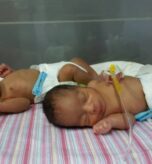Should I eat differently now I’m pregnant?
That depends on what you were eating before! If you already eat healthily, you may only need to make a few tweaks to your daily diet. But if you’ve been living on ready meals or takeaways, or you have a bad crisps or chocolate habit, it might be time for a nutritional makeover.
What does a healthy pregnancy diet include?
Eating a healthy pregnancy diet means you’ll get all the nutrients you and your developing baby need. Your daily meals should include a variety of foods from the four main food groups:
- Fruits and vegetables. Aim to eat between five portions and seven portions of fruit and vegetables each day, choosing more veg than fruit. Frozen, tinned and dried fruits and vegetables are fine, but varieties with no added salt or sugar are better for you. Juices and smoothies also count. But the natural sugars can affect your blood sugar levels and damage your teeth, so it’s best to limit the amount you drink.
- Starchy food. These include starchy root vegetables such as potatoes, plantain and yams, and wholegrain cereals such as brown rice and quinoa. Breads, crackers, pasta and breakfast cereals are also in this group. Choose wholemeal bread or half-and-half varieties when you can.
- Foods rich in protein. These include lean meat and chicken, fish, eggs and pulses (such as beans and lentils). Aim to eat two or more portions of fish a week, including at least one but no more than two portions of oily fish such as mackerel or sardines.
- Dairy foods. These include milk, cheese and yoghurt, which are a good source of calcium. Varieties that are low in fat and sugar are the healthiest options.
Many people have low levels of iodine in their diet. Iodine is a mineral found in food that’s essential for your baby’s brain development. Dairy foods and seafood are a good source of iodine. If you’re adding salt in cooking, it’s better to opt for sea salt, which contains iodine, rather than rock salt.
Do I need to eat more calories now I’m pregnant?
When you’re pregnant, your body makes even better use of the energy you get from your food. This means you don’t actually need any extra calories for the first six months of pregnancy, despite what you may have heard.
For the last three months of your pregnancy, you only need about 200 extra calories a day to help support your growing baby. This is equivalent to:
- a couple of oatcakes with mashed avocado on top
- a toasted pitta bread with two tablespoons of hummus
- a slice of wholemeal toast with a small can of baked beans
Your appetite is your best guide of how much food you need to eat. You may find your appetite fluctuates throughout your pregnancy.
In the first few weeks of pregnancy, your appetite may fall away dramatically and you may not feel like eating proper meals, especially if you have nausea or sickness. Bland, starchy foods such as plain crackers may be all you feel like eating.
During the middle part of your pregnancy, your appetite may be the same as before you were pregnant, or slightly increased. Towards the end of your pregnancy, your appetite will probably increase.
If you suffer from heartburn or a full feeling after eating you may find it easier to have smaller, more frequent meals, instead of your usual breakfast, lunch and dinner.
The best rule to remember is to eat a good balance of foods every day, and you’ll gain weight steadily as your baby grows.
Should I take any vitamin supplements?
Yes, the NHS recommend that you take two important supplements during your pregnancy:
-
- 400 micrograms (mcg) folic acid a day for the first 12 weeks
- 10mcg of vitamin D a day throughout your pregnancy (this is what the government recommends for everyone over one year old)
If you claim certain benefits or if you have a low income, you may be eligible for Healthy Start vouchers. These free vouchers can be exchanged for healthy foods and vitamins. You’re also eligible if you’re under 18 and pregnant.
If you don’t have any complications during your pregnancy, folic acid and vitamin D are the only vitamins you need. However, some mums-to-be choose to take a pregnancy multivitamin that also contains vitamins such as iron, calcium, vitamin C, and zinc.
If you take a multivitamin, make sure it’s specifically for pregnancy. Other multivitamins may contain retinol, which can be toxic to unborn babies. Pregnancy multivitamins contain carotene, the plant-based type of vitamin A, which is safe for your baby. By your third trimester, your body absorbs three times more iron than before pregnancy. This means that iron-deficiency anaemia is very common in pregnancy.
Your midwife will check your blood for signs of iron-deficiency anaemia during your pregnancy. If they’re low, she may prescribe iron supplements.
Unless you have iron-deficiency anaemia, you should be able to meet your iron requirements by including plenty of iron-rich foods in your diet. Red meat, fish, eggs, beans and pulses, leafy green vegetables, nuts and fortified cereal are all good sources of iron.
Some news stories have suggested that pregnant women should take iodine supplements. Although iodine is important for your baby’s development, taking an iodine supplement is not currently recommended in the UK. This is because too much iodine can cause thyroid problems. Instead of a supplement, try to include iodine-rich foods, such as dairy products and fish, in your weekly diet.
Talk to your GP or midwife about special supplements you may need if you:
- eat a vegetarian or vegan diet
- eat a restricted diet, for example because of a food intolerance or for religious reasons
- have diabetes or gestational diabetes
- have a family history of neural tube defects, or if your partner does
- have anaemia
Are there any foods I shouldn’t eat during pregnancy?
There are some foods that you’ll have to steer clear of during pregnancy, because they may be unsafe for you or your baby:
- Pates, unpasteurised milk and cheese, and mould-ripened cheeses, may contain a dangerous bacteria called listeria. Avoid cheeses that have a white rind, such as brie or camembert, and soft, blue-veined cheeses such as roquefort.
- Cured or undercooked meats may contain a parasite that causes toxoplasmosis, an illness that can cause pregnancy and birth complications. Also, make sure you cook ready-meals thoroughly.
- Raw shellfish, such as oysters and prawns may contain bacteria and viruses. Sushi that has not been frozen before making should also be avoided, as it may contain parasitic worms. Most sushi sold in shops is safe, but if you’re in any doubt, it is best not to risk eating it. Smoked fish is safe to eat during pregnancy.
- Avoid raw or undercooked eggs, unless they are marked with a red British Lion Quality stamp. Some eggs can cause salmonella food poisoning, but British Lion eggs have such a low risk of carrying salmonella bacteria that they are safe to eat runny. Foods made from raw egg, such as homemade mayonnaise, are also fine to eat if you’re certain British Lion eggs were used, or if the eggs have been pasteurised. Other foods that may cause salmonella food poisoning are raw shellfish, and raw or undercooked meat.
- Shark, swordfish and marlin contain unsafe levels of mercury, which can affect your baby’s nervous system. Tuna contains some mercury too, so it’s best not to eat more than four medium-sized cans or two fresh tuna steaks each week.
- Don’t eat liver and liver products such as pate, liver sausage and fish oil supplements. Liver may contain large amounts of retinol, the animal form of vitamin A. Too much of this could be harmful to your developing baby.
- You should stop drinking alcohol during pregnancy. There’s no way to know how much alcohol is safe, if any. However, we do know that the more you drink, the higher your baby’s risk of long-term health problems. In the first trimester, alcohol can also increase your risk of miscarriage. That’s why experts recommend avoiding it altogether while you’re pregnant.
- Don’t have more than 200mg of caffeine a day. That’s about two mugs of tea or instant coffee. Fizzy drinks and energy drinks also contain caffeine so check the labels of these when choosing what to drink. You could switch to decaffeinated drinks instead.
Some research has suggested that eating starchy foods that have been over-cooked may be associated with low birth weight. This is due to a natural chemical called acrylamide that’s formed as foods such as potatoes and bread are fried, baked, roasted or grilled at high temperatures.
More research is needed to be sure of the risks acrylamide poses to you and your baby. But it’s easy to reduce levels of acrylamide in your diet, so you may think it’s worth doing anyway:
- Don’t overcook starchy food. For example, fry potatoes and chips so they take on only a light colour, and eat toast that’s no darker than pale brown.
- Cook pre-prepared foods that need frying or oven-heating according to the packet instructions.
- Try not to eat too many packet biscuits or ready meals, as acrylamides have been found in processed foods.
Store potatoes somewhere dark, cool and dry, but not in the fridge. Putting them in the fridge can increase the amount of sugar they hold, which could lead to higher levels of acrylamide when you bake, roast or fry them.
Is it safe to go on a diet during pregnancy?
Dieting during pregnancy could harm you and your developing baby. Some diets can leave you low on iron, folic acid, and other important vitamins and minerals.
Remember, weight gain is a positive sign that you’re having a healthy pregnancy. As long as you’re eating fresh, wholesome foods and gaining weight, just relax. You’re supposed to be getting bigger!
If you were overweight before you became pregnant, ask your GP or midwife for more advice about managing your weight during pregnancy.
How much weight should I gain in pregnancy?
On average, you’ll gain between 11.5kg and 16kg (25lbs and 35lbs).
However, this amount will vary from woman to woman depending on a range of factors. Eating a well-balanced diet, with little in the way of fats and sugars, should prevent you gaining too much weight.
How many meals should I eat each day?
Even if you’re not hungry, chances are your baby is, so try to eat regularly. Aim for three meals a day and healthy snacks if you’re hungry in between.
And if morning (or all-day) sickness, food aversions, heartburn or indigestion make eating a chore, eat smaller but more frequent meals. You may find it easier on your body.
Eating high-fibre and wholegrain foods will help to keep you feeling full, and will be more nutritious too.
Can I still have occasional treats during pregnancy?
You don’t have to give up all your favourite foods just because you’re pregnant. But eating meals and snacks that are high in fat, salt and sugar should be kept to a minimum.
Instead of a packet of crisps or a bowl of ice cream, try eating something healthier such as beans on toast, or a piece of fresh fruit. But don’t feel guilty if you’re tempted by the occasional biscuit.
To make healthy eating easier, check out our trimester-by-trimester pregnancy meal planners, plus our guide to eating more fruit and veg.
Source: Baby Centre UK




